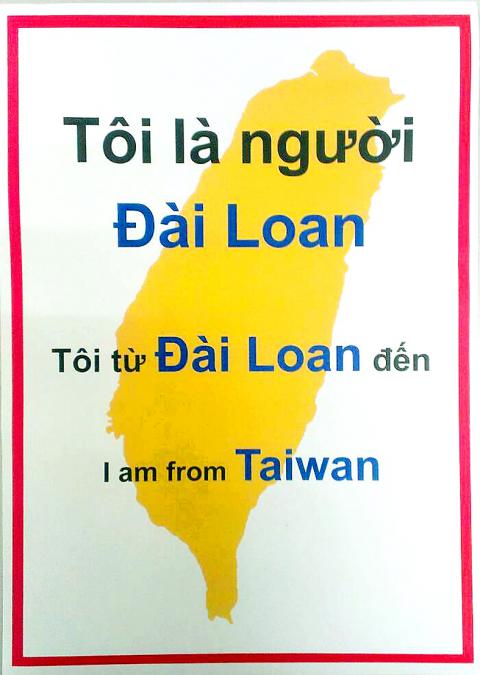The Ministry of Foreign Affairs (MOFA) yesterday came under fire over stickers it designed identifying the wearer as a Taiwanese national and which it planned to give to Taiwanese in Vietnam in a bid to protect them from being attacked by anti-China protesters.
The stickers bear the message: “I am Taiwanese. I am from Taiwan” written in Vietnamese against a yellow silhouette of the island with “I am from Taiwan” repeated underneath in English.
Minister of Foreign Affairs David Lin (林永樂) said the ministry’s missions in Vietnam will give Taiwanese businesspeople there the stickers so “Vietnamese could easily distinguish them and their firms from their Chinese counterparts.”

Photo: MOFA
According to the ministry, out of the 2,287 Taiwan-funded firms in Vietnam, 669 are located in Binh Duong Province and 331 in Dong Nai Province, the sites of the violent protests against Beijing’s move to put an oil rig close to the Paracel Islands (Xisha Islands, 西沙群島) in the South China Sea, which are claimed by Taiwan, Vietnam and China.
The plan to hand out stickers to the estimated 40,000 Taiwanese in Vietnam drew harsh criticism from opposition lawmakers.
Democratic Progressive Party (DPP) Legislator Kuan Bi-ling (管碧玲) said the ministry’s stickers could put Taiwanese in danger because Vietnamese are taught that Taiwan is part of China, so what is needed is to clarify that Taiwanese are not from China.
DPP Legislator Tsai Chi-chang (蔡其昌) said Taiwanese firms and factories had been “inadvertently affected” by the anti-China sentiment in Vietnam because school textbooks teach pupils that “Taiwan is a province of China.”
The ministry should demand that Hanoi allow companies owned or funded by Taiwanese to display the Republic of China (ROC) flag to protect themselves from anti-Chinese violence, much as South Korean companies have done, DPP Legislator Tsai Huang-liang (蔡煌瑯) said.
Taiwan Solidarity Union Legislator Chou Ni-an (周倪安) asked the ministry to replace the slogan on the sticker with “I am ROC citizen. I am from the ROC.”
“You favor the ROC over Taiwan, don’t you? So why did you choose to use the designation ‘Taiwan’ this time?” Chou said.
Lin responded that despite Hanoi’s adherence to the “one China” policy and the way in which the Taiwan-China relationship is explained in schools in Vietnam, the majority of Vietnamese have a clear understanding that there is no connection between Taiwan-owned firms and China because Taiwanese have been investing in the country for more than 20 years.

CHAOS: Iranians took to the streets playing celebratory music after reports of Khamenei’s death on Saturday, while mourners also gathered in Tehran yesterday Iranian Supreme Leader Ayatollah Ali Khamenei was killed in a major attack on Iran launched by Israel and the US, throwing the future of the Islamic republic into doubt and raising the risk of regional instability. Iranian state television and the state-run IRNA news agency announced the 86-year-old’s death early yesterday. US President Donald Trump said it gave Iranians their “greatest chance” to “take back” their country. The announcements came after a joint US and Israeli aerial bombardment that targeted Iranian military and governmental sites. Trump said the “heavy and pinpoint bombing” would continue through the week or as long

TRUST: The KMT said it respected the US’ timing and considerations, and hoped it would continue to honor its commitments to helping Taiwan bolster its defenses and deterrence US President Donald Trump is delaying a multibillion-dollar arms sale to Taiwan to ensure his visit to Beijing is successful, a New York Times report said. The weapons sales package has stalled in the US Department of State, the report said, citing US officials it did not identify. The White House has told agencies not to push forward ahead of Trump’s meeting with Chinese President Xi Jinping (習近平), it said. The two last month held a phone call to discuss trade and geopolitical flashpoints ahead of the summit. Xi raised the Taiwan issue and urged the US to handle arms sales to

BIG SPENDERS: Foreign investors bought the most Taiwan equities since 2005, signaling confidence that an AI boom would continue to benefit chipmakers Taiwan Semiconductor Manufacturing Co’s (TSMC, 台積電) market capitalization swelled to US$2 trillion for the first time following a 4.25 percent rally in its American depositary receipts (ADR) overnight, putting the world’s biggest contract chipmaker sixth on the list of the world’s biggest companies by market capitalization, just behind Amazon.com Inc. The site CompaniesMarketcap.com ranked TSMC ahead of Saudi Aramco and Meta Platforms Inc. The Taiwanese company’s ADRs on Tuesday surged to US$385.75 on the New York Stock Exchange, as strong demand for artificial intelligence (AI) applications led to chip supply constraints and boost revenue growth to record-breaking levels. Each TSMC ADR represents

State-run CPC Corp, Taiwan (CPC, 台灣中油) yesterday said that it had confirmed on Saturday night with its liquefied natural gas (LNG) and crude oil suppliers that shipments are proceeding as scheduled and that domestic supplies remain unaffected. The CPC yesterday announced the gasoline and diesel prices will rise by NT$0.2 and NT$0.4 per liter, respectively, starting Monday, citing Middle East tensions and blizzards in the eastern United States. CPC also iterated it has been reducing the proportion of crude oil imports from the Middle East and diversifying its supply sources in the past few years in response to geopolitical risks, expanding